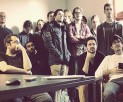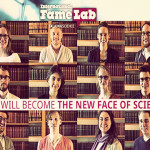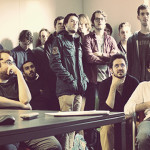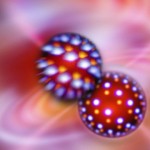There they are: gravitational waves
‘It’s a very special moment’, says theoretical physicist Eric Bergshoeff, right before the press conference where scientists from LIGO (the Laser Interferometry Gravitational-wave Observatory) in Livingston, Louisiana and Hanford, Washington announce that they have genuinely detected gravitational waves. ‘Later, we’ll be saying: 11 February, 2016 was the day. It’s one of those moments where later you’ll be asking each other: where were you?’
Super spectacular
Only four months ago, after a conversation about his quest to unify gravity and quantum mechanics, he predicted that a discovery like this was coming ‘within the next ten years.’ He was waiting impatiently, because gravitational waves could potentially help with that nearly unsolvable problem. Did he think it would happen this fast? ‘I thought it would take another few years,’ he says.
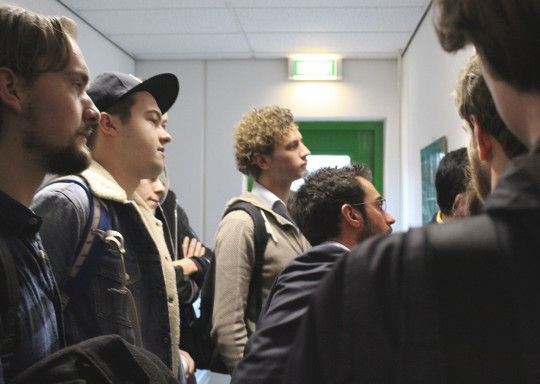
His colleague and string theory physicist Diederik Roest has been excited all week. ‘This is really super spectacular.’ Gerco Onderwater, employed at CERN, has a gleam in his eyes. ‘This is so great!’
Tenterhooks
Several doors down, a lecture hall is filling up with the institute’s physicists. Everyone is on tenterhooks. Although many details about the announcement have already leaked, every still wants to see it.
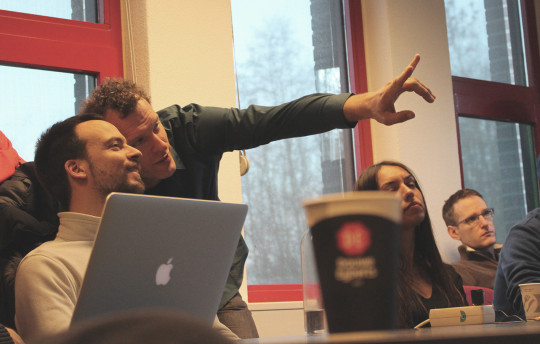
What’s it all about? Einstein predicted the existence of gravitational waves, a kind of ripple in spacetime. It is widely known that gravity distorts space. According to Einstein, small ripples are continuously travelling through the universe, just like water in a pond into which someone has thrown a stone. The effect is so small as to be practically impossible to measure. But if there is an enormous amount of energy released, for example when two black holes merge, you might just be able to measure it. That would finally confirm Einstein’s predictions.
Mirrors
And that is exactly what has happened. American scientists built enormous detectors, inside which a laser beam is split into two perpendicular beams and bounced back through a complicated system of mirrors. When the two beams converge again, they should cancel each other out unless one of them is pulling along a gravitational wave that causes a distortion of a fraction of a second in one of the laser beams.
‘The effect is minuscule’, says Bergshoeff. ‘It’s a hair’s breadth in relation to the distance to the sun.’ That is why hyper-sensitive equipment is needed to measure it.
New eyes
The search for gravitational waves has been going on for a long time. The LIGO experiment has been running for over ten years. In September, the equipment was upgraded, and they hit the jackpot. The article about the detection was published on Thursday. ‘We have new eyes in the universe’, says Bergshoeff. ‘All the measurements we’ve taken so far are based on light: light, electromagnetic radiation, or radio signals. But we can never go back further than 300,000 years after the Big Bang, because before that, there was no light.’
But if you can detect gravitational waves, you can go back further. And that opens the door to a host of new possibilities. All the physicists in the room agree: this is the dawning of a new age.
‘We did it!’
As the press conference is about to begin, a large group of students gather outside the entrance. They crane their necks to catch a glimpse of what is going on inside. And then, it’s time. The press conference opens with a powerful announcement: ‘We did it. We detected gravitational waves!’
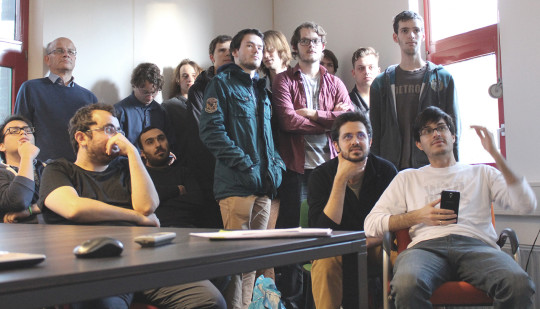
Afterwards, Roest is quite impressed. ‘I can’t believe it, they actually saw two black holes merge.’ Yet he is critical as well. The gravitational waves are irrefutable. The charts shown are very convincing. But was it actually black holes merging? He’s not yet sure he believes it. ‘The measurements do seem to correspond to what Einstein predicted for such an event. But maybe it can be interpreted differently.’
He is going to watch and download the article – as quickly as possible, of course.


